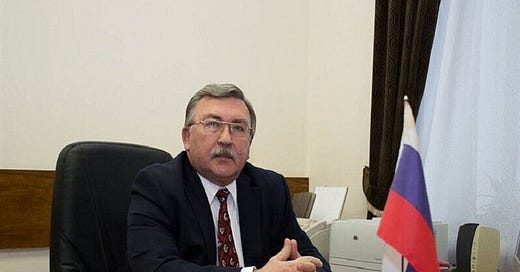A Top Russian Diplomat Clarified The Facts About His Country’s Energy Relationship With Germany
It was Berlin, not Moscow, that suspended Nord Stream II – and under pressure from Washington at that – along with imposing sanctions against its former partner outside the authority of the UNSC, which therefore made the latter illegal in terms of international law.
Russian Permanent Representative to International Organizations in Vienna Mikhail Ulyanov compellingly argued in defense of his country’s reputation as a reliable energy supplier to Germany. He was responding on Twitter to associate fellow at the Royal United Services Institute for Defence and Security Studies Samuel Ramani who tweeted on Sunday that “Olaf Scholz says Russia is not a reliable energy supplier. A decade too late”. Ambassador Ulyanov responded by asking “Have there ever been signs that Russia was an unreliable energy supplier, including in last decade? Provide examples. As far as the current situation is concerned, it is not Russia who started to undermine normal trade and economic relations, including in the field of energy.”
That in turn prompted Ramani to write that “I would argue @Amb_Ulyanov that the structural dependency of Germany and other EU countries on Russian gas is by nature unreliable. Given the post-2014 adversarial climate, it was inevitable that gas supplies would be disrupted due to sanctions and Russian retaliations to them”. Ambassador Ulyanov reacted by explaining that “I didn’t question the right of #Germany to choose or change #energy suppliers. This is Germany’s business. But it is absolutely inappropriate to try to justify the relevant politically (not commercially) motivated decisions by questioning the reliability of Russia as a supplier.” His most recent remark was also picked up by TASS, which brought it to the attention of a wider international audience.
The exchange between Ambassador Ulyanov and Ramani occurred against the backdrop of a technical malfunction unexpectedly resulting in the indefinite disruption of the Nord Stream I gas pipeline from Russia to Germany, which can’t be repaired due to the EU’s compliance with the US’ sanctions regime. Ramani appears to be of the disposition that Moscow simply manufactured a “publicly plausible” pretext to weaponize its energy exports to the bloc as punishment for Brussels going along with Washington’s anti-Russian economic and financial restrictions. Ambassador Ulyanov, however, argued that the implied weaponization of energy is actually being pursued by the EU for purely political purposes that have nothing at all to do with objective commercial realities between the two.
Upon reflecting on their exchange, it becomes clear that Ambassador Ulyanov’s interpretation of events is the most accurate. Germany’s prior governments voluntarily entered into strategic energy cooperation pacts with Russia, which presumably wouldn’t have been done if they had any credible reason to suspect that Moscow would weaponize such exports. Furthermore, the resultant relationship of complex economic interdependence between the two means that Berlin (and by extension Brussels) also has leverage over Moscow with respect to the latter being just as dependent on these ties for ensuring regular budget revenue as Berlin is on ensuring regular energy imports. Their arrangement was therefore an equal one, not lopsided like Ramani describes it, hence why it was originally agreed to.
Complications only arose once a third party, in this case the US, directly began to meddle in their mutually beneficial strategic-energy relationship. Germany immediately complied with its military patron’s pressure to suspend Nord Stream II right after the latest US-provoked phase of the Ukrainian Conflict began over half a year ago. That was a purely political decision exactly as Ambassador Ulyanov described it and had nothing whatsoever at all to do with the actual state of their commercial relations. With these objectively existing and easily verifiable facts in mind connected with the sequence of events that have folded since February 2022, it’s irrelevant whether or not one ascribes to Russia’s official interpretation of Nord Stream I’s unexpected indefinite disruption or Western speculation about it.
The point is that Ambassador Ulyanov’s arguments are accurate with respect to his country not being the one that unilaterally initiated the politically driven sabotage of the strategic-energy ties between Russia and Germany. It was Berlin, not Moscow, that suspended Nord Stream II – and under pressure from Washington at that – along with imposing sanctions against its former partner outside the authority of the UNSC, which therefore made the latter illegal in terms of international law. Considering this, there’s no doubt that it was Germany that weaponized mutually beneficial and strategically equal energy ties with Russia, which adds further credence to the Kremlin’s consistent claim that it’s the West that’s waging a Hybrid War against it and not vice versa.




